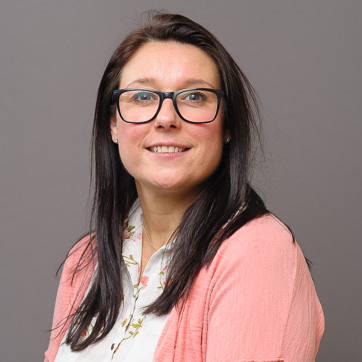A critical care research nurse based at the John Radcliffe Hospital has become the first Oxford University Hospitals nurse to receive funding for a PhD from the National Institute for Health Research (NIHR).
Jody Ede, a sister in the Adult Intensive Care Unit and a researcher in the Kadoorie Centre for Critical Care Research and Education, was awarded an NIHR Clinical Doctoral Fellowship and says she hopes her achievement will convince other nurses to pursue a career in research.

A crucial step in Jody’s career progression was getting a Preparatory Fellowship from the NIHR Oxford Biomedical Research Centre (BRC). This funding supports the career development of nurses, midwives and allied health professionals working for the NHS Trusts in Oxford and/or the University of Oxford.
Forty-year-old Jody will start her PhD in April. The Fellowship gives her three years fully funded to combine her research with clinical work.
“When I found out about the fellowship, at first it was complete disbelief, even though I couldn’t have put any more work in,” Jody says. “I’m just so excited – not just for me, but what it means for nurses contributing to the wider research agenda. Hopefully people will see what I’ve achieved and think that that is a route – another facet to the nursing profession that is achievable.
“And I think our research will be better for it; it will be more diverse, wider opinions, and we’ll investigate things differently – that’s where the value is.”
Jody qualified as a nurse from Oxford Brookes University in 2001, and was soon working the Adult ICU, where she stayed until 2015. During this time, she did a postgraduate qualification in critical care nursing and in 2011 an MSc in advanced clinical practice, again at Brookes and funded by OUH’s Adult ITU.
In 2015, Jody moved to the Kadoorie Centre to work as a research nurse in the Oxford Critical Care Research group, led by Dr Peter Watkinson, who, as an ITU consultant had already worked alongside Jody for a number of years. While working at the Kadoorie Centre, she has maintained her clinical skills as a sister on Adult ICU.
Jody was able to take what she had learned from her MSc into her new role.
“I already had that buzz for research, and Peter and the department encouraged me to find things that I found interesting, and to develop our skills and research portfolio. So I started working on my own projects.
Jody had specialised in recognising the early signs of patient deterioration in critical care settings, and this meshed nicely with the work of the Kadoorie Centre.
She says that the support she got from the Oxford BRC Preparatory Fellowship was an important step for her career progression: “The Preparatory Fellowship allowed me to dedicate a good amount of time to creating the foundations necessary for my research career – all with the eventual aim of building up to a PhD,” Jody says.
She used the year to write up existing work she had done, to do other reading to feed into a literature review for her thesis; it exposed her to data collection, data analysis and writing up academic papers, as well as going on a number of research courses.
“It meant that when I applied for the NIHR fellowship, I was ahead of the game with regard to my CV. I was already able to demonstrate that I understood these research methods and could reference that in my proposal,” she adds.
Dr Watkinson said: “Jody’s fellowship award is richly deserved and a key part of her progression as a clinician researcher. The NIHR Biomedical Research Centre, Oxford, played a key role in giving Jody research experience, and then supporting her with a Preparatory Fellowship.
“Her award is also an important step for the OUH and should encourage nurses, midwives and allied health professionals to follow Jody’s example”.
Still pursuing her interest in spotting the signs of patient deterioration, Jody is approaching the subject of her PhD from a novel angle. The subject of her PhD is: “What success factors facilitate escalation of care and how can these be applied more reliably”
“Traditionally in healthcare, we’ve tried to learn from failure, which is the right thing to do. But failure to act on a patient deterioration is relatively rare, which is why they stick in our minds. We’re conditioned to focus on the dangerous things and ignore the normal,” Jody explains.
“What we are doing is looking at how we do it right so often, and unpicking the underlying mechanisms that make it work, and applying those success factors more reliably. It’s a new way of thinking about patient safety, which is hopefully why they thought it was interesting.”
It’s a subject that Jody’s colleagues in ITU are also excited about – they are already talking about how her findings can be applied when she finishes her PhD.